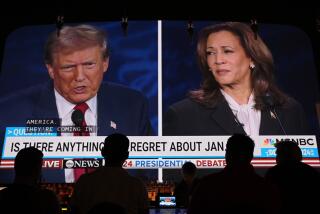Supreme Court Halts Louisiana’s Early Primary
- Share via
WASHINGTON — The Supreme Court threw out part of Louisiana’s open-primary practice Tuesday, ruling that a state may not choose its members of Congress before the official federal election day.
By a unanimous vote, the justices struck down a statute that allowed congressional candidates to be elected in October. The court said Louisiana’s system ended up forcing voters to turn out for two sets of federal elections and influenced congressional races in the rest of the country, where voting takes place on the Tuesday after the first Monday in November.
In an opinion by Justice David H. Souter, the court said the Constitution gives Congress the final say on the date of national elections. The justices concluded that an 1872 law setting a single November day for all congressional and presidential elections holds for the entire nation.
Under a 1975 Louisiana law, the state has held an “open primary” for members of Congress in October. All candidates, regardless of their party, appeared on the same ballot and all voters, regardless of their party affiliation, chose among the candidates. If no candidate for a given office received a majority, the state held a runoff between the top two vote-getters the next month, on the federal election day.
But if a candidate did get a majority in October, as has happened more than 80% of the time, that candidate was elected in the October balloting. Defending its law against a constitutional challenge, Louisiana contended that the October primary was only held to determine which candidates qualify for the November ballot.
But the court said in Foster vs. Love that because the state law allows a candidate to conclusively win the office before the national election day, it conflicts with the federal statute. Legal experts said Louisiana is alone in allowing for potentially conclusive results before November.
A separate case Tuesday involved a federal prisoner who bribed a deputy sheriff into allowing the inmate to have conjugal visits with both his wife and his girlfriend. The deputy was charged with violating federal racketeering, conspiracy and bribery law.
In a unanimous decision in Salinas vs. United States, the justices said federal bribery law does not require proof that federal funds were involved.
More to Read
Sign up for Essential California
The most important California stories and recommendations in your inbox every morning.
You may occasionally receive promotional content from the Los Angeles Times.










